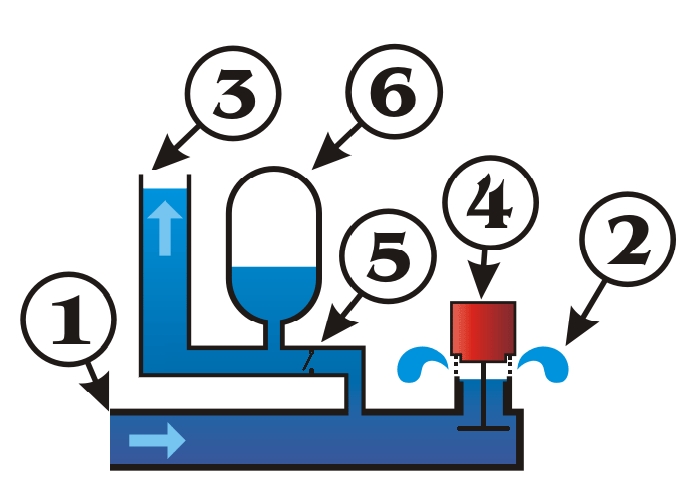

Cj Verde wrote:
Blayne Prowse wrote:Meat, fat and vegetable/fruit carbs for me!
I agree completely except for December when I indulge in holiday cookies. It's December 2! Better preheat the oven!!!

Glenn Underhill wrote:Monte linked to a youtube video by engineer775. I don't think Monte picked that one randomly. Engineer775 has some of the best videos on ram pumps.

Monte Hines wrote:Subject interests me for several reasons:
I can remember my uncle (40+ years ago) using one to pump water up a 200' hill, from a creek, to water his large beef cow herd...
I never knew how it worked...
Also, we might want to use one on our farm, where we have water, and do not have electrical power...
I spent some time researching and have created a blog on the subject:
"Water Pumps Without Electricity or Fuel" - Hydraulic Water Ram Pumps and Others...
There is lots history, theory, practice, homemade plans, videos, etc... all at
--> http://hines.blogspot.com/2012/02/water-pumps-without-electricity-or-fuel.html
Basic components of a hydraulic ram:
1. Inlet - drive pipe
2. Free flow at waste valve
3. Outlet — delivery pipe
4. Waste valve
5. Delivery check valve
6. Pressure vessel
First Video of: Water Pumps Without Electricity or Fuel Playlist - 7 Video - 21:53
http://www.youtube.com/watch?v=nU5AXw6fWXg&list=PL2A382B614E076834&index=1&feature=plpp_video
First Video of: Hydraulic Water Ram Pumps-Theory and Practice Playlist - 9 Videos - 1:14:28
http://www.youtube.com/watch?v=4y_WWxWdn5A&list=PL78401A89D14D8922&index=1&feature=plpp_video
Just trying to contribute...
Hope this is helpful...
With Regards and Respect For All,
Monte Hines
Xisca Nicolas wrote:After avoiding wheat, I found out that it was also better to avoid all kind of sugar. After years gluten free, some digestive problems were coming back... Might not be only gluten for some people, but also the carbohydrate part!
I think sugar is not part of paleo anyway! fruits yes.... fruit juice no...

mike jastram wrote:Thank you to everyone who's supporting us!
Some items for the list:
Amazon items:
The Beginner's Guide to Hunting Deer for Food
Camp Chef Portable Outdoor Oven
(or similar propane oven)
Non-Amazon:
We need axes - preferably with good handles but I can sharpen them here.
Any rugs (not carpeting scraps) that aren't atrociously worn or dirty.
Wool: We urgently need raw wool for insulation projects. We can also use wool blankets or shearskin for textile hangings and projects.Pp
Leather: Preferably cowhide, but I'll use anything I can get. Preferably not super nasty chemical tan.
Gary Hughes wrote:I live in OK and since I live outside a small rural town there is no inspections and the only thing I needed was a $30 permit. I'm doing a straw bale house with an earthen floor. I've got my roof up with minimum 30" of overhang all the way around. I'm just now plastering the straw with clay dug from my trenches and I'm using "clean screenings" from the local rock quarry as the sand. So far not a single crack and I attribute that to the powdery stuff in the screenings. If screenings get wet and then dry they are hard so they must have some sort of bonding in them but they break apart, but with clay and straw added it becomes as hard as rock or stucco. I plan on sifting out the bigger particles for the last coat though since they are slightly bigger than normal sand. My straw bales are only insulation, and provide no structural support. I would highly recommend you orient to the south and use as much passive solar design as you can. Just realize it will take longer than you think, at least it is for me. It's a one man show here.
Biggest costs for far, trusses $3500 standing seam metal roof $5000, lumber...don't know for sure but maybe $1500-2000? straw $1000 labor of love, priceless.
james beam wrote:From Stone County, AR there really is no 'building code'...when your outside of city limits, if your inside city limits then there is building code enforcement thru the city planning & zoning office, I think it would be easier for you to just call them at 870-269-3686. Electrical installation even outside the city limit, minimally requires an licensed electrician to 'sign off' on your electric installation, before the Entergy 800-368-3749 will hook on to the house. Don't get 'city water' or rural water if you can help it, heavy chlorinated, and can become expensive if you get rural water service 'tap' out to your place, ya have to continue to pay for that tap even if you have the water meter pulled out, I think a 'perk test/septic tank' outside of the city limit, is required before they will hook up water service, if your in town, you have to pay to hook on to the sewer & continuous sewer cost thereafter. A water well can be drilled by a permit/ licensed driller, ya better figure 200 feet deep?..depends...and ask the driller how much he gets, last time I checked it was around $8/foot but you should find out first hand from the driller. So various 'improvements' to a property should be considered before you buy, as all these add up quick... electric, water, natural gas, roadways, telephone...you might want to find a place that at least has what utilities you need already 'available' nearby. Building a RMH in town, ask planning & zoning, out of town should be easy enough, don't know if insurance would...........
james beam